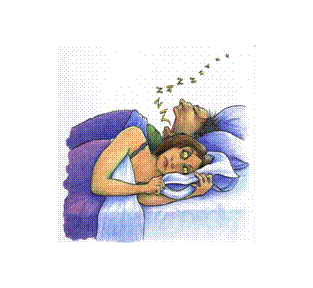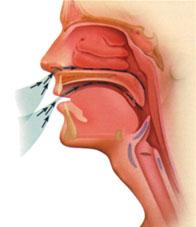|
TT Sleep |
|
Sleep Smart |



|
Snoring |
|
Snoring, like all other sounds, is caused by vibrations that cause particles in the air to form sound waves. For example, when we speak, our vocal cords vibrate to form our voice. When our stomach growls (borborygmus), our stomach and intestines vibrate as air and food move through them.
While we are asleep, turbulent airflow can cause the tissues of the nose and throat to vibrate and give rise to snoring. The structures involved are mainly the uvula , soft palate and tongue.
Briefly, snoring is a sound resulting from turbulent airflow that causes respiratory tissues to vibrate during sleep.
In some cases the sound may be soft, but in other cases, it can be rather loud and quite unpleasant.
There are a variety of factors that can lead to snoring, such as the anatomy of your mouth and sinuses, alcohol consumption, allergies, a cold, and your weight.
When you doze off and progress from a light sleep to a deep sleep, the muscles in the roof of your mouth (soft palate), tongue and throat relax. The tissues in your throat can relax enough that they vibrate and may partially obstruct your airway. And, the more narrowed your airway, the more forceful the airflow becomes. This causes tissue vibration to increase, which makes your snoring grows louder. The following conditions can affect the airway and cause snoring:
· Your mouth anatomy. Having a low, thick soft palate or enlarged tonsils or tissues in the back of your throat (adenoids) can narrow your airway. Likewise, if the triangular piece of tissue hanging from the soft palate (uvula) is elongated, airflow can be obstructed and vibration increased.
· Being overweight. Extra weight can build up in your throat and contribute to narrowing of your airway.
· Alcohol consumption. Snoring can also be brought on by consuming too much alcohol before bedtime. Alcohol relaxes throat muscles and decreases your natural defenses against airway obstruction.
· Nasal problems. Chronic nasal congestion or a crooked partition between your nostrils (deviated nasal septum) may contribute to your snoring.
· Sleep Apnea
|
|
|
|
What is snoring? |
WHAT CAUSES SNORING?
|
IS SNORING DANGEROUS TO MY HEALTH?Snoring may be a sign of obstructive sleep apnea, a serious disorder in which the snorer stops breathing several times an hour during sleep. If you snore loudly, have frequent pauses in breathing while asleep, wake up gasping for air, suffer from sleepiness during the day, fall asleep easily during the day, there is a high probability that you suffer from sleep apnea.
Sleep apnea increases risk of dying five fold |
|
· How common is snoring?
Any person can snore. Studies estimate that 45% of men and 30% of women snore on a regular basis. Frequently, people who do not regularly snore will report snoring after a viral illness, after drinking alcohol, or when taking some medications.
People who snore can have any body type. We frequently think of a large man with a thick neck as a snorer. However, a thin woman with a small neck can snore just as loudly. In general, as people get older and as they gain weight snoring will worsen.
|
|
· Sleep apnea. · Snoring may also be associated with obstructive sleep apnea. In this serious condition, your throat tissues obstruct your airway, preventing you from breathing. · Sleep apnea is often characterized by loud snoring followed by periods of silence when breathing stops or nearly stops. Sometimes, complete obstruction doesn't occur, but rather, while still snoring, the airway becomes so small that the airflow is inadequate for your needs. · Eventually, the lack of oxygen and an increase in carbon dioxide signal you to wake up, forcing your airway open with a loud snort or gasping sound. · This pattern may be repeated many times during the night. · To be diagnosed with obstructive sleep apnea, these periods when breathing slows or stops must occur at least five times an hour. |

|
Phone: 868 657 7636
Fax: 868 652 0053
E-mail: steve.medford@gmail.com ttsleep@gmail.com |

